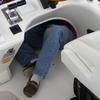I am writing a difficult piece about a marina that is attempting to achieve electrical perfection. This quest includes testing of all vessels for electrical problems. The question is this. When using a half silver chloride probe, in the water, and using the ground lug of a shore power cord for connection to the ground/bonding system, can the length of the shore power cord, say two fifty foot cables, coupled with some unmeasured level of corrosion (resistance) affect the meter's reading. I have always done this from inside the vessel while connected directly to the bonding system. My very basic understanding of ohms law says that as the resistance increases, voltage will also increase, (V = I x R) thus the readings will be skewed with an increase in circuit resistance. But like all things in life, i suspect the answer may not be that simple. Any comments would be appreciated
The Panbo Forum
Return to Panbo Forum main page »


Many of us have galvanic isolators on our boats, which places a diode in the circuit between our boat ground and the ground on our shore cable.
I have long forgotten the details of how the isolator works, but at the very least there is a voltage drop of 0.7 volts involved. Wouldn't that interfere with the measurement ?
I roughly recall someone selling an all in one dock pedestal testing product that measures current on all the AC leads plus a sensor you place in the water. It effectively tests both the outlet on the pedestal and the connected boat. Be sure to look that up for your article.
V = I * R, and you're wondering whether an R > 0 may play a role in measuring V. Mr. Ohm tells us that if I (the current down the cable) goes to 0 the voltage drop along the cable goes to 0 as well. Thus, if you measure the current in the cable it should tell you what I is, and you can find R from the manufacturer data.
Kees, thank you for the response. I apologize in advance for my naivety. If I understand this correctly, you are saying that as resistance, increases(R) Current (I) has to decrease proportionally, as long as V is a constant. So in plain words resistance through the shore power cable, does not affect voltage measurements,as described. Did I understand this correctly, or do I have to go back to the books. Thanks for the help, Bill Bishop
Hi Bill,
What you say is true, but my point was that the current through the ground cable is (should be) zero. As the current is almost zero the voltage drop along the cable will also be almost zero, assuming the resistance of the cable is not infinite! In other words, a reasonable resistance (still